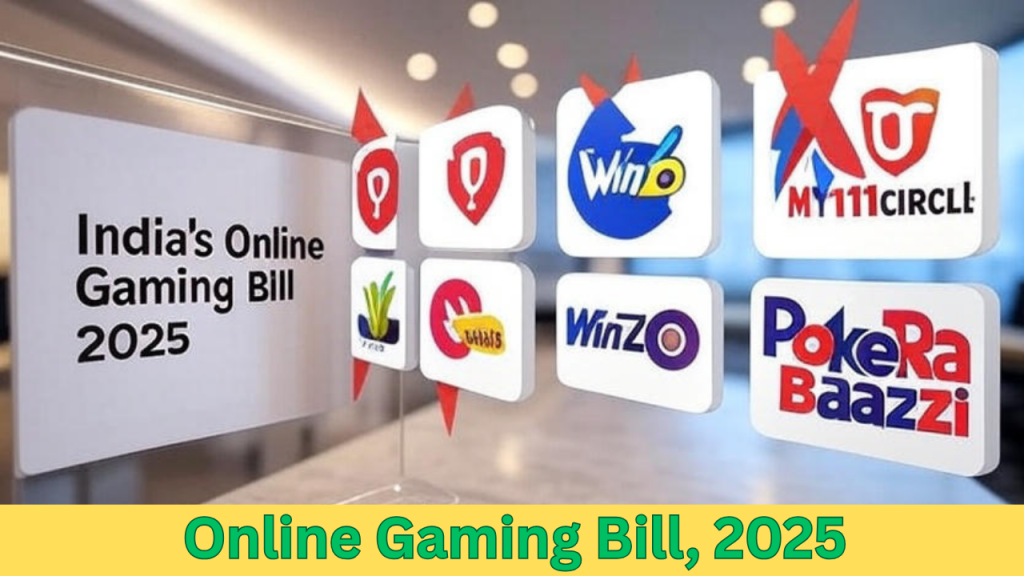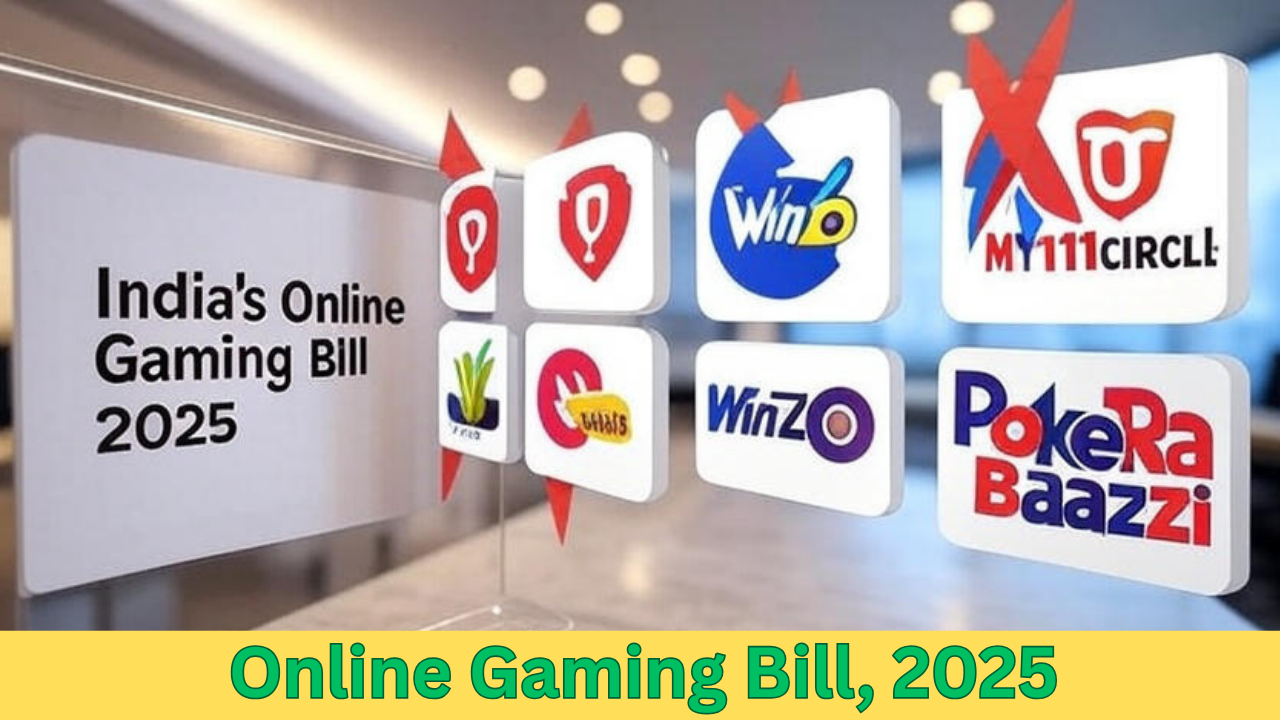India Online Gaming Bill 2025: Key Changes, Impacts, and Future Outlook
india Online Gaming Bill 2025 ; In the fast-evolving digital landscape of India, where over 45 crore gamers engage daily, the passage of the Promotion and Regulation of Online Gaming Bill, 2025, marks a pivotal moment. Introduced and swiftly passed in the Lok Sabha on August 20, 2025, and approved by the Rajya Sabha the following day amid opposition protests, this legislation aims to curb the dark side of online gaming while fostering its positive potential
As the bill awaits presidential assent to become law, it signals a bold shift: banning real-money games to protect vulnerable users from addiction and financial ruin, while promoting esports and social gaming as avenues for skill-building and entertainment. This comprehensive reform could reshape a $3.8 billion industry, balancing societal welfare with economic innovation.

India Online Gaming Bill 2025 ;Understanding the Bill
The Promotion and Regulation of Online Gaming Bill, 2025, is a landmark piece of legislation piloted by Union Electronics and IT Minister Ashwini Vaishnaw. At its core, the bill draws a clear line between harmful “online money games” and beneficial forms of gaming. Online money games are defined as any digital platform where users deposit money to participate, with outcomes leading to monetary gains or losses, regardless of whether they are based on skill, chance, or a combination.
Key provisions include:
- Blanket Ban on Real-Money Gaming: No entity can offer, host, or facilitate games involving monetary stakes. This extends to banks and financial institutions, which are barred from processing related transactions
-
Stringent Penalties: Violators face up to three years in prison and fines up to ₹1 crore for facilitation, or two years and ₹50 lakh for promotion and advertising. Enforcement allows warrantless searches to ensure compliance
-
Regulatory Body: A national Online Gaming Authority will be established to oversee the sector, certify permissible games, and promote safe practices.
-
Promotion of Positive Gaming: The bill encourages esports as a legitimate sport, online social games for entertainment, and educational games for skill development. The government plans to support training academies, awareness campaigns, and international competitions
Passed via voice vote despite opposition walkouts over unrelated issues like electoral roll revisions in Bihar, the bill reflects the government’s urgency to address a sector plagued by inconsistencies in state laws.
This follows earlier measures, such as the 2023 IT rules amendments and a 28% GST on online gaming, but goes further with a complete prohibition on money games
India Online Gaming Bill 2025 :Why Was the Bill Introduced
India Online Gaming Bill 2025 The bill’s introduction stems from mounting concerns over the societal and economic fallout from unregulated online gaming
India, home to one of the world’s largest gaming populations, has seen explosive growth in real-money platforms, but at a steep cost.
- Addiction and Mental Health Crisis: With 45 crore gamers, many young and vulnerable, addiction has led to severe mental health issues, including suicides and family breakdowns
Minister Vaishnaw highlighted how opaque algorithms in these games foster compulsive behavior.
- Financial Devastation: Players incur annual losses estimated at ₹20,000 crore, often resulting in debt, bankruptcy, and economic distress. The bill positions this as a public health emergency, prioritizing protection over profit.
- Fraud, Money Laundering, and Security Risks: Platforms have been misused for scams, terror financing, and illegal activities, exploiting gaps in state regulations. Celebrity endorsements have amplified these issues, drawing in unsuspecting users.
- Youth Safeguarding: The legislation aims to shield minors from harmful content while channeling energy into productive gaming forms.
Lok Sabha Speaker Om Birla described it as a “national interest” bill, emphasizing its role in preventing family destruction. This move aligns India with global trends in strict gaming regulation, addressing a sector that has outpaced oversight.
India Online Gaming Bill 2025 : Projected Profits
While the ban on real-money gaming may seem draconian, the bill promises substantial long-term gains by redirecting the industry toward sustainable growth.
- Esports Boom: Recognized as a competitive sport, esports will receive government support, including guidelines for events, training institutions, and incentives. This could position India as a global esports hub, especially with its Olympic debut in 2027, creating jobs in coaching, event management, and tech.
- Societal and Health Savings: By curbing addiction, the bill could reduce healthcare costs, suicides, and family disruptions. Preventing ₹20,000 crore in annual losses will enhance financial stability.
- Innovation in Non-Monetary Gaming: Educational and social games will thrive, fostering skills like strategy and creativity. This shift could attract ethical investments, growing the overall market beyond $3.8 billion.
- Regulatory Clarity: A centralized authority will streamline compliance, boosting investor confidence and international collaborations.
| Key Benefits | Estimated Impact |
|---|---|
| Esports Development | Job creation in thousands; global competitiveness. |
| Addiction Reduction | Lower suicides and mental health costs. |
| Financial Protection | Savings of ₹20,000 crore in player losses annually. |
| Innovation Boost | Shift to ad-based and subscription models. |
These advantages underscore the bill’s focus on public welfare, potentially saving lives and building a healthier digital ecosystem.
India Online Gaming Bill 2025 : Potential Losses
Critics argue the bill’s blanket ban could devastate the industry, leading to significant economic repercussions.
- Revenue and Tax Shortfalls: The government may lose ₹15,000-20,000 crore in annual GST and taxes from real-money gaming, which accounts for 86% of the sector’s revenue.
- Job Losses: Over 200,000 direct and indirect jobs are at risk, with companies like Dream11 and MPL facing shutdowns or massive layoffs.
- Investment Drain: The $25 billion sector could see valuations wiped out, driving businesses offshore and eroding FDI of over ₹25,000 crore.
- Black Market Risks: Prohibition might fuel underground gaming, exacerbating fraud without oversight.
| Key Challenges | Estimated Impact |
|---|---|
| Tax Revenue Loss | ₹15,000-20,000 crore per year. |
| Employment Hit | 200,000+ jobs lost. |
| Industry Valuation | Potential $15-25 billion erosion. |
| Legal Battles | Constitutional challenges on trade restrictions. |
Industry bodies like the All India Gaming Federation warn of a “shock” to startups seeking regulation, not bans. Legal experts predict court challenges, but the government remains confident in its public interest grounding.
India Online Gaming Bill 2025 : BANNED APPS
Below is a comprehensive table summarizing the major platforms affected, based on detailed analysis from reliable sources. The data includes platform names, types, download figures, ratings, and additional relevant details such as user base associations or specific impacts.
| Platform Name | Type | Downloads | Rating | Additional Details |
|---|---|---|---|---|
| Dream11 | Fantasy Sports | Over 100M | 4.5 | – |
| My11Circle | Fantasy Sports | 50M+ | 4.3 | Part of Games24x7 |
| Howzat | Fantasy Cricket | 10M+ | 4.6 | – |
| SG11 Fantasy | Fantasy Sports | 500K+ | 3.6 | – |
| WinZO | Multi-game RMG platform | 50M+ | 4.1 | – |
| Games24x7 | (Includes My11Circle & RummyCircle) | RummyCircle: 50M+ | 4.2 | Also operates My11Circle |
| Junglee Games | Rummy & Poker | Rummy: 10M+; Poker: 1M+ | – | Offers both Rummy and Poker games |
| PokerBaazi | Poker | 100K+ | 3.7 | Investor: Nazara Technologies, shares fell 7% post-bill |
| GamesKraft (RummyCulture) | Rummy | 10M+ | 4.2 | – |
| MyTeam11 | Fantasy Sports | 5M+ | 4.2 | – |
| Nazara Technologies | Investor in PokerBaazi | – | – | Shares fell 7% post-bill, no download or rating data |
Non-affected: BGMI, Free Fire, Valorant—focusing on skill without money. These platforms, backed by billions in investments, must adapt or face closure.
conclusion
The Promotion and Regulation of Online Gaming Bill, 2025, is a double-edged sword: a necessary safeguard against exploitation, yet a disruptive force for a thriving industry. By banning real-money games, it addresses addiction and fraud head-on, potentially saving billions and countless lives. Simultaneously, promoting esports and social gaming opens doors to innovation and global leadership. As stakeholders navigate this transition—amid job losses, legal hurdles, and economic shifts—the bill could usher in a more ethical, sustainable gaming future for India’s youth.
